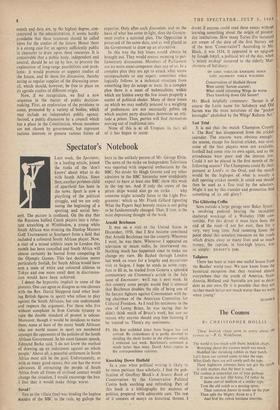Spectator's Notebook
LAST week, the Spectator, in a leading article, joined the ranks of the 'don't' knows' about what to do with South Africa. Since then, another problem child of apartheid has been in the news. Sport is now a plaything of the political struggle, and we are only seeing the beginning of a sporting and social boy- cott. The picture is confused. On the day that the Russians bullied Czech players into a reluc- tant scratching at Wimbledon, a young white South African was winning the Dunlop Masters Golf Tournament at Southport from a field that included a coloured South African player. Now, a visit of a mixed athletic team to London this month has been cancelled and South Africa will almost certainly be barred from competing in the Olympic Games. This last decision seems particularly foolish, for South Africa would have sent a team of white and coloured athletes to Tokyo and one more small dent in discrimina- tion would have been achieved.
I detest the hypocrisy implicit in some of the protests. One can agree or disagree as one chooses with the Rev. David Sheppard (and other lead- ing British figures in sport) who refuse to play against the South Africans, but one understands and respects the argument. For those who live without complaint in Iron Curtain tyranny to raise the double standard of protest is odious. Moreover, though it would be invidious to name them, some at least of the many South Africans who are world names in sport are numbered amongst the opponents of the policies of the South African Government. In his most famous speech, Edmund Burke said, 'I do not know the method of drawing up an indictment against .an whole people.' Above all, a peaceful settlement in South Africa must still be the goal. Unfortunately, as with so many good causes, this one has the worst advocates. If ostracising the people of South Africa from all forms of civilised contact would. change the situation, I would encourage the ban. I fear that it would make things worse.






























 Previous page
Previous page